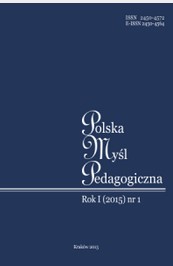PHILOSOPHY OF VALUES AS AN INSPIRATION AND THE BASIS OF THE DIRECTIONS IN THE DEVELOPMENT OF EDUCATIONAL SCIENCE IN POLAND (1918–1939)
PHILOSOPHY OF VALUES AS AN INSPIRATION AND THE BASIS OF THE DIRECTIONS IN THE DEVELOPMENT OF EDUCATIONAL SCIENCE IN POLAND (1918–1939)
Author(s): Janina KostkiewiczSubject(s): German Idealism, History of Education, Pre-WW I & WW I (1900 -1919), Interwar Period (1920 - 1939)
Published by: Wydawnictwo Uniwersytetu Jagiellońskiego
Keywords: pedagogy of culture; Polish pedagogy in 1918–1939; philosophy of values; pedagogy of values;
Summary/Abstract: The origins of educational science are tied to the anti-naturalistic breakthrough in the humanities and to the work of such authors as W. Dilthey, H. Rickert, J. Kerschensteiner, E. Spranger, or T. Litt. In Poland, the so-called ‘pedagogy of culture’ has enjoyed a broad, diverse and multi-threaded kind of development. A personal-creative role of values in the process of education lies at its core, while the pluralism of its directions stems from the different philosophical bases (along with religions affiliated with them) that became the constituents of its concepts. The paper identifies three main directions in the development of pedagogy of culture in Poland, referring to the philosophy of German idealism (Hegel’s objective spirit), the neo-Kantians of the Baden school, the Catholic direction with its philosophy of moderate realism (Thomism and neo-Thomism), and the direction rooted in Polish culture and philosophy: that of a secular and left-wing nature. The article presents the classification I made of the selected directions in the development of educational science.
Journal: Polska Myśl Pedagogiczna
- Issue Year: 5/2019
- Issue No: 5
- Page Range: 71-91
- Page Count: 21
- Language: English

